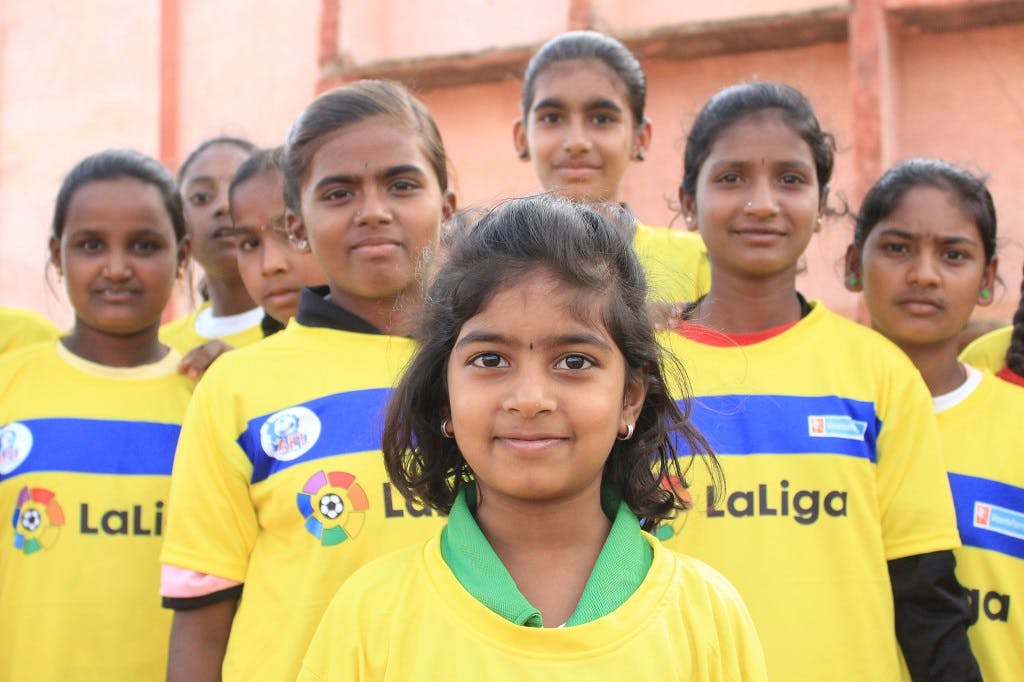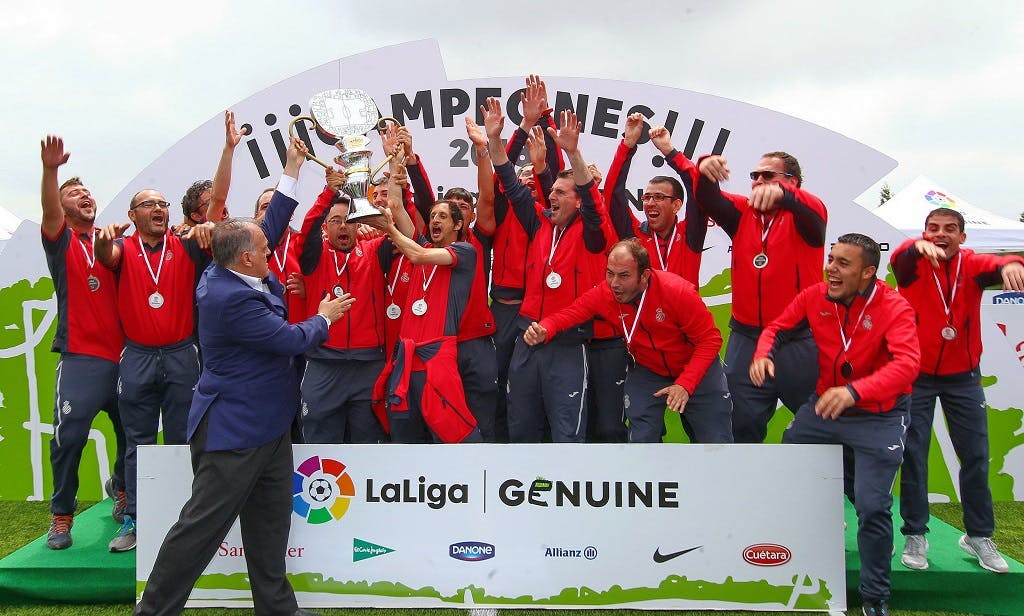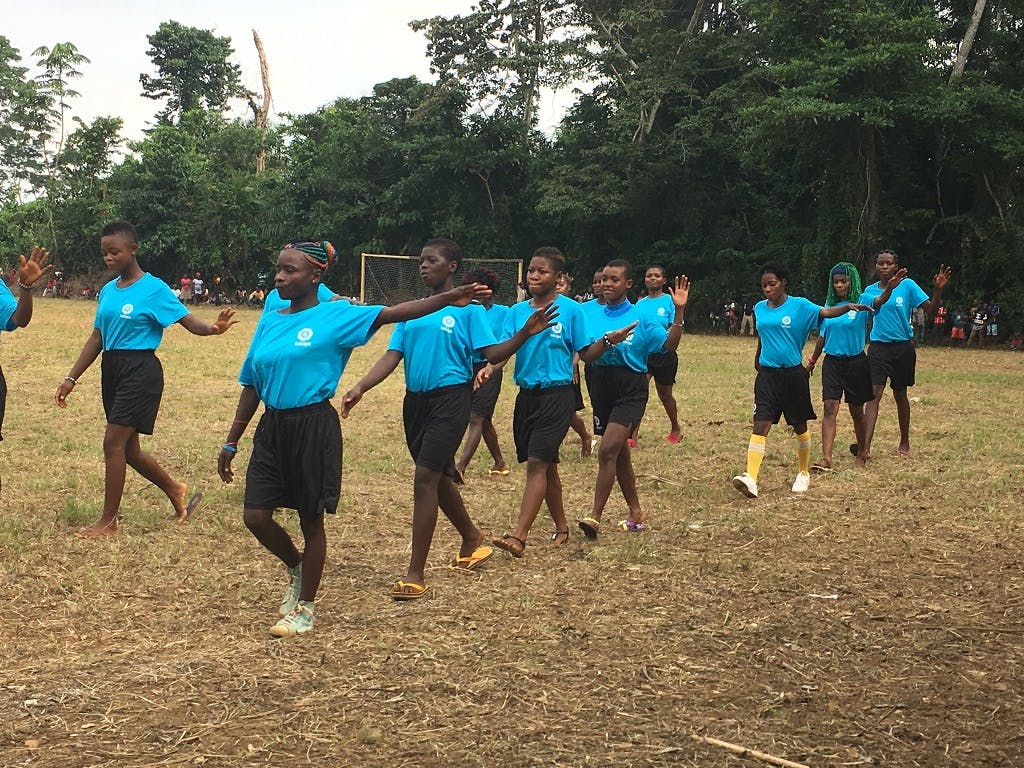This article was produced in association with LaLiga
LaLiga’s international reputation extends beyond the renowned qualities of its world-beating clubs and their superstar footballers.
Corporate social responsibility (CSR) has been an increasingly central focus of LaLiga in recent times, with a total of €67m having been ploughed into the Spanish league’s CSR strategy in 2017-18 alone.
The vast majority of the total has been allocated towards active participation and community development, including support for amateur football, women’s football, the second tier, training programmes worldwide, the LaLiga scholarship plan and some 65 different national sports associations, among other project areas.
Anticipating future changes in the law that could require all companies to develop a social responsibility policy, LaLiga has seized the initiative, even though currently only companies listed on Spain’s stock exchange have to implement such a programme.
Meanwhile LaLiga has already spent two years establishing an in-house CSR project via the Social Fair Play programme, through the LaLiga Foundation.
Q&A: David Baixauli, project manager, corporate at LaLiga
David Baixauli, LaLiga’s project manager, corporate, explains why and how CSR has become such an integral part of LaLiga’s offering.
Why has CSR been implemented as part of LaLiga’s general strategy?
Since the implementation of the financial control system, which came into force for clubs with the Royal Decree that centralised the sale of media rights, there have been two significant impacts.
Firstly, there has been an increase in social actions by clubs due to their improved financial health. Secondly, there has been an increase in terms of LaLiga’s financial investments in a broad CSR programme due to improved income, resulting from a rise in revenue from the current process for marketing the media rights.
This increase in social actions, and the large financial investments, have required an orderly framework for action and dissemination with centralised management through an assessment system that allows us to implement methods to measure and control our social actions and thereby assess and quantify the social profitability of our programmes.
The aim is to provide lessons and encourage our clubs to increase their social actions in line with LaLiga’s social strategy. Our principles are to standardise and create a code of conduct; to earn an official certification for our CSR activities; to verify and audit the value chain; and to report social actions.
What is the purpose of LaLiga’s CSR strategy?
LaLiga’s strategic objective is to establish itself as an instrument of guidance and support for the development of social, ethical and responsible practices. In the present day, professional sport comprises an increasingly globalised industry that has an obligation to praise its positive social effects and its financial dimension over and above certain irresponsible practices that must not damage our credibility and social image.
What is the leadership structure behind LaLiga’s CSR strategy?
The Foundation has always been the compass and executive arm of all the social activities and recently the creation of a CSR department has been assessed in order to amplify its actions and to organise and disseminate the entirety of its social work, both internally and externally.
Which areas are covered by LaLiga’s CSR strategy?
There are five key areas of interest. The first of these is human rights, with the scope including actions against discrimination and vulnerable social groups. In the second area, labour practices, we are focused on human development and continuing education at work, plus the quest for fair working conditions and social protection. The third area looks at fair operating practices, and covers responsible political participation, fair competition, promotion of social responsibility in the value chain and respect for property rights.
The fourth area, active participation and development of the community, encompasses training in grassroots football, solidarity and social protection of amateur football and high-level sport, promotion of community involvement, promotion of women’s football and development and promotion of the 65 sports associations in Spain. The final area of interest is governance, namely the integration of responsibility across the entire organisation.
How is the CSR strategy integrated into the rest of the LaLiga brand?
We want to carry out ethical and responsible efforts, which are not limited to specific social actions disseminated in extensive strategic plans and CSR reports, but also have the objective of the LaLiga brand being perceived as more than simply ‘brand-washing’.
The strategic key to integrating our CSR project with the brand and its promotion is to unite our social objectives with the brand principles. This will allow us to increase our social contributions, viewing the social factor as an opportunity to stand out in the market.
How are LaLiga’s CSR activities promoted?
At LaLiga we believe that when developing true social responsibility actions, their publication is not the priority, because the main objective is to assess whether our actions truly bring about social change in the conditions of a community or the social groups in which we operate. Even so, disseminating the values – rather than the actions – of LaLiga’s CSR programme is one of the core aspects of our strategic plan.
Together with the communications and brand departments, two measures are being implemented. Firstly, the coordination of content, channels, media and methods of communication. Secondly, in the immediate future, the publication of the governance report, CSR report and economic/financial report as a single comprehensive public accountability document.
How do you expect LaLiga’s CSR strategy to develop over the coming years and what are your hopes?
We aim to convert our CSR project into a differentiating element, which gives our brand a different direction, providing it with greater authenticity and strength, to grow over time. We also want to achieve a comprehensive alignment of LaLiga’s strategic CSR plan with the CSR programmes of each and every club, and for LaLiga to continue to expand its actions as a driving force behind them.
“In short, our main approach is to stand out from the competition thanks to the social factor and to increase our actions in terms of corporate responsibility, as the basis for social responsibility.

A foundation for change: The LaLiga Foundation
Twenty-five years after its launch, the pioneering LaLiga Foundation is continuing to play a leading role in the CSR programme of Spanish football’s top league.
The programme’s work is underpinned by institutional, cultural, educational and social activities, “with the objective of transforming society through conveying the positive values inherent to football”, according to the foundation’s director, Olga de la Fuente.
Under the four pillars of integrity, hard work and self-improvement, teamwork, and transparency and good governance, the foundation supports projects that focus on the most vulnerable groups in society, with a particular focus on childhood and youth; education; sport and values; social inclusion; promoting equality; solidarity; and development.
“Our projects are designed to be sustainable over time, seeking to generate a positive impact on society and on the environment in which we carry out our activity,” de la Fuente says.
Unique projects have been launched by the foundation – which has a budget of €4.25m ($4.9m) for the 2018-19 season.
Unique projects
The Future Fan campaign, an educational initiative for schoolchildren, encourages positive sporting values, such as sportsmanship, tolerance and respect, with a commitment towards eradicating violence from football. In the third edition of the project, which concluded in June, Future Fan reached out to 13,000 students across Spain.
The Winning Values programme, meanwhile, aims to improve social harmony in schools by revitalising sports participation and has been awarded the ‘Injuve Young Talent’ honour by the Spanish Youth Institute (Injuve), affiliated with the Ministry of Health, Social Services and Equality.
The Social Fair Play project seeks to promote football’s positive social issues, while the foundation has collaborated with other organisers to support the launch of the Spanish Volunteering Platform.
In addition, in the field of educational activity, a roster of prestigious speakers are lined up to ensure the foundation is considered a “point of reference in terms of sports law and other related subjects”, de la Fuente says.
“All of this contributes to the ongoing education of professionals at our affiliated clubs and public limited sports companies in the wide range of subjects which affect their daily work,” she adds.
International sphere
The foundation’s work pushes boundaries, metaphorically and geographically. In the international sphere, the league’s CSR initiatives are helping to enhance LaLiga’s social brand and its global positioning.
“We take part in Erasmus+ Projects financed by the European Union through which we collaborate with other leagues and European social organisations on projects of social inclusion through football, as well as socio-educational intervention and training through agreements with leading institutions in different countries around the world,” de la Fuente says.
With activities spanning several areas, the foundation’s CSR initiatives are having an impact on the lives of many – with more set to benefit in the future.
“The principle mission of the LaLiga Foundation is to transform society with the positive values of sport in general, and of football in particular, as well as to get the world of football to be viewed and ultimately renowned as an agent that is seriously committed to the common good of society,” de la Fuente adds.
“At the LaLiga Foundation we are actively working to become a point of reference in CSR in the coming years and, at the same time, we remain immersed in our internationalisation process, through the different projects we develop in multiple countries in collaboration with leading local partners.”

The LaLiga Foundation’s LaLiga Genuine project
The LaLiga Foundation’s pioneering LaLiga Genuine project has set a new benchmark in terms of social responsibility and integration.
The initiative, the first of its kind, launched last season, with 462 players with intellectual disabilities representing a total of 18 clubs in more than 200 matches. Building on the success of the inaugural campaign, the 2018-19 season will feature 30 clubs.
The format of the league is unique. Eight-a-side matches consist of four quarters of 10 minutes each, while the teams can be single or mixed-gender, with all players being over the age of 16.
The upcoming campaign will be split into four rounds across six venues. The opening round will take place in Tarragona on November 16-18, while the final round will take place at Valencia’s training complex on June 14-16. In between, the clubs will be split into two groups of 15 teams, competing in rounds staged by Córdoba CF, RC Deportivo de la Coruña, Rayo Vallecano and Atlético Madrid, with the latter’s games being held in Los Ángeles de San Rafael, Segovia.
“It will be a project that stands the test of time,” de la Fuente says. “In LaLiga Genuine it is not just the results of the matches that count, but also the positive sporting attitudes demonstrated during the games. As such, the teams receive a series of points each matchday which reward behaviour and actions representing sportsmanship and fair play by the players, coaches and fans. It is about sharing first and competing second.”
Game-changing idea
LaLiga Genuine was the brainchild of two young Club Gimnàstic de Tarragona fans, Alvaro and Ruben, who have Down’s Syndrome. The youngsters submitted their idea to create the league to LaLiga in March 2016.
“LaLiga president, Javier Tebas, did not hesitate to give it the go-ahead,” de la Fuente explains. “From that moment, the LaLiga Foundation worked with a group of clubs that already ran a team or school for people with intellectual disabilities to identify the participation requirements, format and rules of the competition through a process of consensus and collaboration.
“LaLiga Genuine perfectly reflects the values which LaLiga seeks to project. The league is here to stay and will be given the same importance as the top-tier LaLiga Santander, second-tier LaLiga 1I2I3 and the women’s Liga Femenina Iberdrola.”
According to de la Fuente, the clubs were eager to lend their support when the project was presented to them by LaLiga in April 2017.
“It was undoubtedly a huge challenge for everyone,” she adds. “However, thanks to the support and experience of clubs that already had teams of this nature within their sporting structures, we were able to lay the foundations of the competition. LaLiga Genuine is an integration initiative that is here to stay and our greatest desire is for all Spanish professional football clubs to be involved in it in the future.”
LaLiga’s commercial partners have also supported the venture. “All of them have done so without seeking a financial return, but instead looking to join the cause as part of their corporate social responsibility programmes,” says de la Fuente, who adds that the league is working on new partnerships that would promote training and job opportunities for the players.
Engagement
LaLiga Genuine has also provided a platform for supplementary activities, which have generated significant levels of engagement.
Under the Wish Boots initiative, which coincided with the final round in Vigo last season, LaLiga created a Christmas greeting by inviting social media users to send words of support and encouragement to the LaLiga Genuine players via the #HappyGenuine hashtag.
“We received over 1,000 messages, both from anonymous well-wishers and current and former top-level players, so we decided to take it a step further,” de la Fuente explains. “Thanks to our collaboration with Nike, we obtained 500 pairs of boots for the players of the 18 participating teams and we decided to inscribe them with the messages of support that we received. We gave them out as a big surprise in Vigo.”
This season, the competition for the top-tier LaLiga title is as fierce as ever, with the likes of Barcelona, Real Madrid, Atlético Madrid and Sevilla being the four main contenders at this point in the season. However, in LaLiga Genuine, the overriding theme is unquestionably “sharing first, competing second”.
De la Fuente concludes: “That is the essence of this competition, the league of sporting values: respect, friendship, camaraderie and teamwork, sportsmanship and integration. In this league it is not just the results of the matches that count, but also the positive sporting attitudes demonstrated during the 90 minutes. It is a league that demonstrates the great human quality of all its participants and provides us with a great deal of value.”
